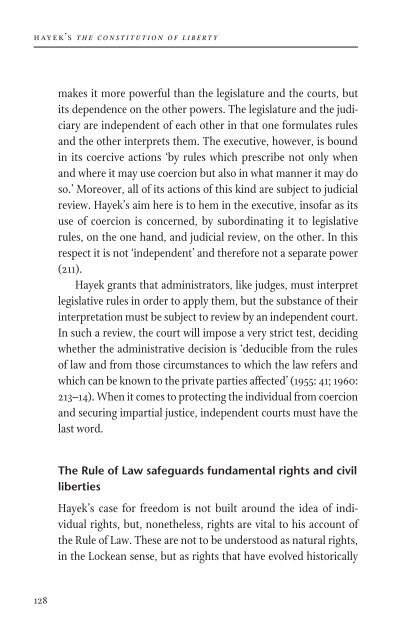Hayek's The Constitution of Liberty - Institute of Economic Affairs
Hayek's The Constitution of Liberty - Institute of Economic Affairs
Hayek's The Constitution of Liberty - Institute of Economic Affairs
You also want an ePaper? Increase the reach of your titles
YUMPU automatically turns print PDFs into web optimized ePapers that Google loves.
h ay e k ’ s t h e c o n s t i t u t i o n o f l i b e r t y<br />
r e q u i r e m e n t s o f t h e r u l e o f l aw<br />
makes it more powerful than the legislature and the courts, but<br />
its dependence on the other powers. <strong>The</strong> legislature and the judiciary<br />
are independent <strong>of</strong> each other in that one formulates rules<br />
and the other interprets them. <strong>The</strong> executive, however, is bound<br />
in its coercive actions ‘by rules which prescribe not only when<br />
and where it may use coercion but also in what manner it may do<br />
so.’ Moreover, all <strong>of</strong> its actions <strong>of</strong> this kind are subject to judicial<br />
review. Hayek’s aim here is to hem in the executive, ins<strong>of</strong>ar as its<br />
use <strong>of</strong> coercion is concerned, by subordinating it to legislative<br />
rules, on the one hand, and judicial review, on the other. In this<br />
respect it is not ‘independent’ and therefore not a separate power<br />
(211).<br />
Hayek grants that administrators, like judges, must interpret<br />
legislative rules in order to apply them, but the substance <strong>of</strong> their<br />
interpretation must be subject to review by an independent court.<br />
In such a review, the court will impose a very strict test, deciding<br />
whether the administrative decision is ‘deducible from the rules<br />
<strong>of</strong> law and from those circumstances to which the law refers and<br />
which can be known to the private parties affected’ (1955: 41; 1960:<br />
213–14). When it comes to protecting the individual from coercion<br />
and securing impartial justice, independent courts must have the<br />
last word.<br />
<strong>The</strong> Rule <strong>of</strong> Law safeguards fundamental rights and civil<br />
liberties<br />
Hayek’s case for freedom is not built around the idea <strong>of</strong> individual<br />
rights, but, nonetheless, rights are vital to his account <strong>of</strong><br />
the Rule <strong>of</strong> Law. <strong>The</strong>se are not to be understood as natural rights,<br />
in the Lockean sense, but as rights that have evolved historically<br />
and have found expression in various constitutional provisions.<br />
What can statements <strong>of</strong> rights add to the general argument for<br />
freedom? After all, under ‘a reign <strong>of</strong> freedom the free sphere <strong>of</strong> the<br />
individual includes all action not explicitly restricted by a general<br />
law’ (216). If the individual enjoys the freedom (or right) to do<br />
whatever a general law does not restrict, then what is gained by<br />
enumerating specific rights? And since any enumeration is necessarily<br />
incomplete, isn’t there a danger <strong>of</strong> depreciating rights that<br />
aren’t explicitly recognised? Hayek acknowledges this danger,<br />
but concludes that bills <strong>of</strong> rights have in the past afforded ‘an<br />
import ant protection for certain rights known to be easily endangered’<br />
(216).<br />
In the Cairo Lectures, Hayek identifies the rights associated<br />
with ‘life, liberty, and property,’ along with liberty <strong>of</strong> speech,<br />
religion, the press and assembly, as essential ones; and he stresses<br />
the right to private property in particular, since rules <strong>of</strong> property<br />
determine ‘the boundaries <strong>of</strong> individual private spheres in the<br />
material world, and ways <strong>of</strong> voluntarily changing these boundaries’<br />
(1955: 44). Hayek’s emphasis in <strong>The</strong> <strong>Constitution</strong> <strong>of</strong> <strong>Liberty</strong> is<br />
on how rights are endangered by advancing technologies (216).<br />
He acknowledges the importance <strong>of</strong> procedural safeguards, but<br />
does not expect that they will remain effective if belief in the Rule<br />
<strong>of</strong> Law is weakened (218–19).<br />
How do bills <strong>of</strong> rights serve to protect individual freedom?<br />
Hayek grants that neither legal guarantees <strong>of</strong> fundamental rights<br />
nor constitutional provisions can, in themselves, ‘prevent any<br />
suppression <strong>of</strong> rights by the deliberate action <strong>of</strong> the ultimate legislator’<br />
(217). We recall that the ultimate legislator, in democracies,<br />
is the people, or, more precisely, public opinion or the prevailing<br />
sense <strong>of</strong> justice (1955: 33; 1960: 217). <strong>Constitution</strong>al formulations<br />
128<br />
129












